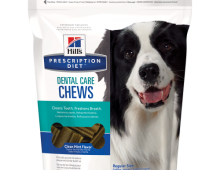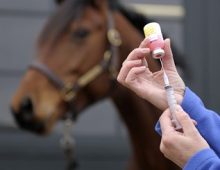Category Archives: tips
Double Defense Against Heartworm Disease
With mosquito season upon us, remember to protect your dog from deadly heartworm disease. We recommend a monthly heartworm & intestinal parasite dewormer. We ALSO recommend that you protect your dog with a monthly dose of Vectra 3D, which combats fleas, ticks & the mosquitoes that transmit heartworm. Using both methods of protection boosts success at preventing heartworm transmission to 99%!
Click HERE for more information, including studies showing efficacy of Double Defense strategy for dogs.
Photo courtesy of: http://www.fightheartwormnow.com
Fresh breath for Valentine's Day!
February is National Pet Dental Health Month!! To help the special pet in your life have their brightest, whitest smile, stop by our clinic and pick up a bag of dental care treats for Valentine’s Day. We just received our first shipment of the new Hill’s Prescription Diet Canine Dental Care Chews and have a limited supply of free samples! We also carry dental treats for cats, which have proven very popular with the kitties.
For more ways to help keep your pets’ breath fresh and their mouths health, click HERE
Happy Thanksgiving!!
Can my dog have turkey scraps? My cat likes cranberry sauce; is that okay? If you’re wondering what’s safe for your pets, you are not alone. To get you started, remember to Be Careful of the Bones!! From all of us here at Willow, have a safe & happy Thanksgiving!
(photo courtesy of: http://www.vvcofhamburg.com/thanksgiving-pet-safety-tips/)
From ABC to E = mc2?
As your kids prepare to go back to school, don’t forget about your playful pooch! Could your dog benefit from going to ‘school?’ Obedient pets are not only safer & more enjoyable to be around, but training will also help strengthen the bond between you & your canine companion. Whether you have a new puppy, or a more mature dog that’s a bit of a ‘wild child,’ consider enrolling in canine obedience classes this fall!
(photo courtesy of: www.petswelcome.com)
Have Cat, Will Travel..?
Does the thought of bringing your cat to the vet give you nightmares? Do you avoid routine veterinary care for your cherished companion because you know you probably won’t see him again for several days (about the same amount of time it will take for the scratches on your arms & face to start healing)? If so, here are a few simple tips that can make regular visits more enjoyable for both you & Kitty:
1. Leave your open carrier in a cat-friendly spot at home, with a familiar blanket, toy, treats, etc. inside, to encourage your cat to go in & become more comfortable with the carrier.
2. Practice car trips with your cat that DON’T end at the vet. Make the trip fun, with treats, toys & lots of petting/praising.
3. Wipe or spray the inside of your carrier with Feliway®, a synthetic pheromone that has been shown to have a calming effect in cats (available at our clinic or online store).
4. Perform mock ‘exams’ on your cat, similar to what the vet will do. This makes your cat more comfortable with being handled.
5. Leave your cat inside its carrier while in the waiting room. The waiting room can be loud & scary, & most cats prefer to ‘hide’ somewhere.
6. Start young! If you have a new kitten, practice these tips from an early age to help avoid issues later on.
Don’t let a ‘scaredy cat’ keep you from maintaining a healthy cat!
(photo courtesy of: www.02varvara.wordpress.com)
Rabies is Incurable?!?
Rabies is a zoonotic disease, meaning it can be transmitted between people and animals. Wildlife like bats, skunks, and raccoons are some of the most common carriers of the disease. Infection occurs when saliva of the infected animal enters the bloodstream of another mammal (this is often from a bite). The disease can take weeks to months to develop symptoms, but once they develop the disease is fatal. Recent confirmed cases of rabies in bats in Ashland and Bayfield Counties have been documented. Please consider the following steps to protect yourself from this deadly disease:
•Keep your pets current on their rabies vaccination. It is only legally required in dogs, but highly recommend in other species (cats, horses, etc.). Not only will this protect your pet from rabies, but in turn it protects you from being exposed to rabies from your own pet.
•Keep your distance from mammalian wildlife, especially any exhibiting abnormal or sickly behavior (ex. a skunk roaming during daylight, a bat acting weak and sick)
•If you are bit by mammalian wildlife contact your local health department. They will direct you on how to submit the animal for rabies testing, if necessary. Only collect the animal if it can be done safely, and try to avoid damaging the head. If you cannot collect the animal, you should still contact your local health department for further instructions.
•If you find a bat in your house contact your local health department. Bat bites can often go unnoticed while you are sleeping. The health department will direct you on how to submit the animal for rabies testing, if necessary. Dr. Sarah Myers, Willow Animal Hospital
(photo courtesy of: www.delavanlakesvet.com)
TICKS: Beyond Lyme Disease & "Ewww!"
If you have lived in northern Wisconsin long enough you probably have run into a tick or two, or hundreds. You may be familiar with the most common risk with ticks as carriers of Lyme disease. Here are some things you may not know about tick diseases:
•The ticks in our area can carry many diseases that can effect both people and pets (Lyme, Anaplasmosis, Ehrlichiosis, and Rocky Mountain Spotted Fever are some of the most common)
•Of the many tick diseases, only Lyme disease has an available vaccine for dogs
•No vaccine (including the Lyme vaccine) is 100% effective at preventing diseases
•A multimodal approach to tick disease prevention is considered the most effective at keeping your pets safe (Lyme vaccine, topical or oral tick prevention products, daily tick checking, avoiding wooded or long grass areas during peak tick season)
•It can sometimes take several months after a tick bite for disease symptoms to develop
•Symptoms of tick diseases can include lethargy, anorexia, lameness, swollen painful joints, high fever
•The classic “bullseye” appearance of a tick bite that is described in people with Lyme disease is not typically seen in dogs
•Many tick disease infections carry a good prognosis if treated promptly and with the entire course of prescribed antibiotics
•Some tick disease infections can cause very serious side effects that may be fatal (ex. Lyme disease in some dogs can lead to a potentially fatal kidney failure)
Call us if you have other questions about tick diseases! Dr. Sarah Myers, Willow Animal Hospital
(photo courtesy of: www.pvguide.org)
Click HERE for 5 ways to protect your pet from Lyme disease.
Click HERE to learn more about protecting yourself & your family from Lyme disease.
Protect Your Horse With Vaccinations
Every spring questions arise regarding equine vaccination. What does my horse need? When should it be given? And others. Let me share some thoughts that may help you vaccinate your horse appropriately:
Many horses carry the Tetanus organism in their intestinal tract where it does no harm. However, their manure then serves as a source of this bacteria, which is dangerous if it enters the body through a wound. Thus, horses are especially prone to exposure to tetanus and all should receive an annual Tetanus toxoid vaccine. It makes no difference if your horse has exposure to other horses.
In like manner, there is a group of three diseases that are carried by birds and then spread from the bird to your horse via mosquitoes. Your horse can be infected by these agents even if it is totally isolated, simply because there are birds and mosquitoes everywhere.
These three agents/viruses are:
1) Eastern Encephalomyelitis (“Sleeping Sickness”)
2) Western Encephalomyelitis
3) West Nile
I recommend that all horses be vaccinated for these three agents, as well as Tetanus.
All the other vaccines out there are not quite so simple and require some decision-making. One question that I ask is, “Will your horse be exposed to other horses?” If you plan to travel to the fair, horse shows, etc. you should protect your horse against the diseases that spread from horse to horse. These include Rhinopneumonitis and Influenza. Immunity to these agents may not be long-lasting, so plan to vaccinate a month before exposure and/or consider a mid-season booster if your show season is long. Young horses (less than 6 years old) are also susceptible to “Strangles” (Streptococcus Equi). Rabies vaccine is also given to a very small percentage of horses in this area, despite our very low risk.
Beyond that, there are a number of other vaccines available (i.e. Equine Arteritis, Anthrax, Botulism, and Potomac Horse Fever) that are not routine at all for local horses, but may be helpful in special situations involving travel.
Dr. Steve Meyer, Willow Animal Hospital (photo courtesy of: www.thehorse.com
Heartworm Disease is SERIOUS
Heartworm disease is a condition where parasitic worms take residence in the heart. That can result in congestive heart failure and death. It is most likely to affect dogs, but very rarely cats can be infected too. The microfilaria stage of the disease is transmitted by mosquitoes. Once inside their host, the microfilaria develop into adult worms that inhabit the heart. The disease is less common in our area (northern Wisconsin) but we still see cases. Dogs that travel to southern Wisconsin or other warmer states are at a much higher risk. The disease is preventable with a relatively inexpensive and safe monthly heartworm prevention pill. If your dog does contract heartworm disease, early detection can allow for treatment, but at considerable expense and with some risks of serious side effects from the treatment. Advanced stages of heartworm disease are often fatal despite any attempts at treatment. Please schedule an appointment if you would like to learn more about testing or prevention for heartworm disease. Dr. Sarah Myers, Willow Animal Hospital
(photo courtesy of: www.whitecloudvet.com)
Help! My Pet Has Bad Breath!!
February is National Dental Health month! Pets need dental care just as much as we do. Here are some common questions and answers about periodontal disease.
What are some signs of dental disease in my pet?
•Foul smelling breath, brown tartar accumulation on the teeth, food falling out of the mouth when chewing, and inability or difficulty eating hard food are some common signs. Some pets exhibit no signs at all.
What should I do if I think my pet has dental disease?
•Schedule an appointment to consult with your veterinarian. Often they will recommend a dental cleaning just like we get done at the dentist.
How do I prevent dental disease in my pet?
•Yearly or biannual dental cleanings are most effective at preventing and treating disease, but there are some at home products available to help decrease the frequency of cleanings. When you are looking for products to help prevent dental disease, look for the Veterinary Oral Health Council (VOHC) seal of approval. This ensures that veterinarians have studied the product and believe that it actually works. Products (in order of most effective to least effective) include: prescription dental diets, pet toothbrushes and toothpaste, dental chews, and dental sprays. These products are most effective when used on a daily basis. Dr. Sarah Myers, Willow Animal Hospital
(photo courtesy of: www.bmpah.com)















